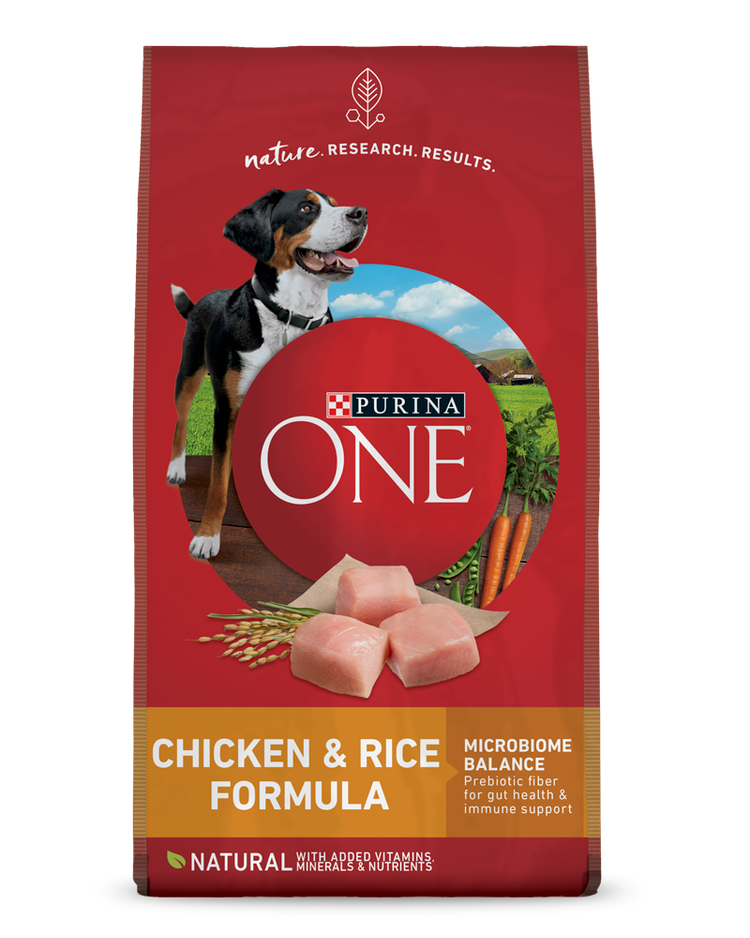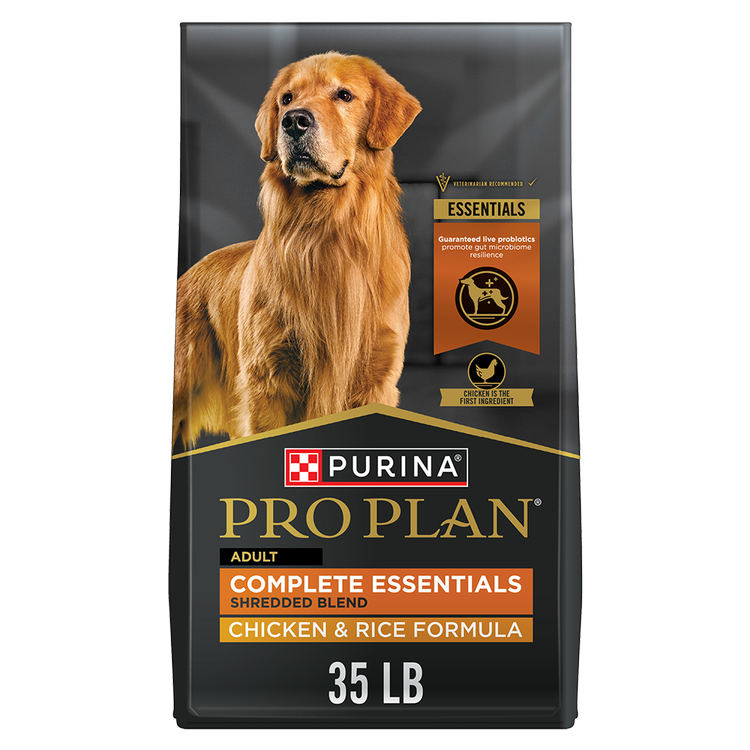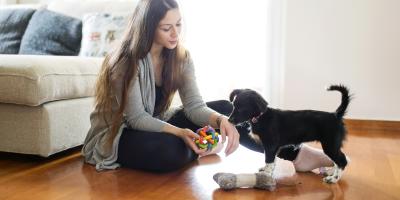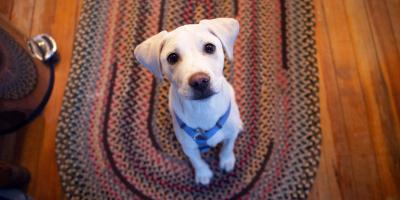Can Dogs Eat Raw Chicken? A Guide to Safety


Dog parents and specialists often debate, Can dogs have raw meat? and Is raw chicken bad for dogs? It’s a controversial topic. Some argue that raw diets provide the food that canines have the biological makeup to consume and digest, as if they were a part of a pack of wolves in the wild. On the other hand, domesticated dog breeds have biological differences from wild dogs. Domestic dogs essentially aren’t accustomed to consuming raw meat, so there are prevalent safety risks to consuming raw meat, including chicken.
Our experts unpack the question, Is raw chicken good for dogs? and share important information for dog parents to know if their dog consumes raw chicken.
So, Can Dogs Eat Raw Chicken?
The hot question is, Can dogs have raw chicken? While dogs can technically eat raw or undercooked chicken, the downsides of raw chicken for dogs are essential for dog parents to know to make informed decisions on dog food and how to take action to ensure dog health and well-being. The predominant downsides of feeding raw chicken to a dog may include, but are not limited to:
- Food poisoning
- Bacterial infections, such as:
- Salmonella
- Campylobacter
- Listeria
- Parasites
- Nutritional deficiency
- Toxic spices, sauces, marinades and coatings used in preparing the raw chicken
- Bone splinters and shards
Can Dogs Eat Raw Chicken Safely?
Can dogs eat raw meat? Our experts do not recommend it. If you’re set on doing so and wondering, Can I feed my dog raw meat from the supermarket? Here are a few of the ways you can more safely prepare raw chicken for dogs.
- We recommend consulting with your veterinarian for specialized advice before deciding to feed your dog raw chicken
- Avoid cross-contamination by keeping chicken in a tightly sealed container in the freezer
- Only choose chicken from a reliable source
- Make sure the raw chicken meat is fresh
- Use gloves or wash your hands immediately after handling the raw chicken meat
- If you are using gloves, dispose of them immediately after use
- Any surfaces that touch the raw chicken must be sanitized
The U.S. Food & Drug Administration (FDA) recommends the following cleaning steps for pet parents who feed raw:
1. Wash Your Hands Thoroughly
Ensure you wash your hands with soap and water for at least 20 seconds after handling raw meat or bones. Also, wash your hands after touching surfaces or objects that may have encountered raw meat or bones, which may include:
- Countertops
- Inside of microwaves and refrigerators
- Kitchen utensils
- Feeding bowls
- Cutting boards
2. Clean and Disinfect Surfaces and Objects
In two steps, extensively clean any surface or object that encounters raw meat or bones:
- Thoroughly wash with hot, soapy water.
- Sanitize with a disinfectant.
A successful disinfectant solution can be 1 tablespoon of bleach mixed with 1 quart of water. For a larger quantity, mix 1/4 cup of bleach with 1 gallon of water.
Alternatively, you can run these items through the dishwasher after each use to clean and disinfect them.
What Are the Risks of a Raw Diet for Dogs?
The FDA and the American Veterinary Medical Association (AVMA) have spoken out against feeding raw chicken to dogs. Here are a few of the risks of a raw diet for dogs in more detail.
Raw Chicken Spreads Foodborne Illnesses
If dogs eat poultry that’s raw, they can get sick like humans from the bacteria and parasites that can be present in raw chicken. Even if your dog is not showing signs of being sick, they can still shed those bugs, and even pass them on to you by something as simple as licking your face or hands.
Eating undercooked chicken is likely to transfer the following illnesses, among others:
- Salmonella
- Campylobacter
- Listeria
Raw Chicken Meals Don’t Provide the Nutrients Dogs Need
Here, we also answer the question: Can dogs eat chicken?, Is chicken good for dogs? and Can dogs eat chicken skin? Plain chicken meals are unlikely to contain the nutrients a dog needs to thrive. Dogs benefit more from food developed by dog nutritionists, such as the Pro Plan or Purina ONE varieties, so pet parents know for sure that the food meets dog safety and nutritional standards.
Choking and Intestinal Blockages
Can dogs eat raw chicken bones or feet? If your dog swallowed chicken bone pieces or whole chicken bones, call your veterinarian. A better chew toy option to raw chicken bones or raw chicken feet for dogs are certain rawhides, or other specifically created chew toys. Some of these are flavored to imitate the flavor of chicken bones or chicken feet for dogs. Regardless of the product you use, any bones, rawhides or chew toys carry a risk of choking or intestinal blockage, so you should take away the chew before it’s small enough to be swallowed.
What to Do if Dog Ate Raw Chicken
Has your dog ingested chicken bones or raw chicken meat? Contact your veterinarian after the dog ingests any amount of raw chicken bones. If your dog ate a large amount of raw chicken meat, consult with your veterinarian immediately. If your dog ate a smaller amount of raw chicken meat, it’s a good idea to watch for any signs of vomiting, diarrhea, loss of appetite, dehydration, fever or lethargy. Then, consult with your veterinarian if you notice those signs. These signs may signal a parasitic or bacterial infection that needs veterinary attention.
Are you wondering, If my dog ate something bad, how long before symptoms? That depends. Symptoms may appear at any time within a week, and veterinarians suggest monitoring for symptoms for a week.
Can Dogs Get Salmonella?
Many pet parents ask, Can dogs get salmonella? or Can dogs eat raw chicken and not get salmonella?
The truth is, yes, pets and people can eat raw food without getting sick, but consuming raw meat (including chicken) significantly increases the risk of becoming sick. Dogs and salmonella can be a dangerous combination. The risks are even higher for growing puppies, geriatric dogs and any dogs with a disease or on medications that lower their immune system.
Also, if a dog contracts salmonella and doesn’t fall ill, the dog can still easily spread the disease to humans. Salmonella in a dog’s stool or saliva could infect humans who come in contact with it.
Complete and balanced dog food options are the safer route to take when feeding your dog chicken. If you'd prefer to feed them grain-free and natural options, there are products available.
For more expert tips on dog feeding, explore our other What Can Dogs Eat articles.
Related articles

Find Your Pet’s Perfect Food
Use our Pet Food Finder to get a custom recommendation from Purina Nutritionists.





